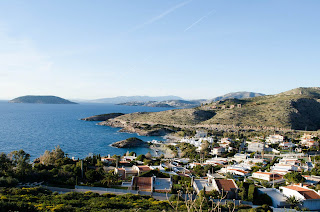My parents and I went on home leave to Greece during March
1940, and it was planned that we would be returning to India in late November.
We had a wonderful time with our relatives and friends in
Athens, visiting the Parthenon and the National Museum. We swam in the refreshing blue waters of the
Saronic Bay, stretching from Phaliron, until Glyfada and Vouliagmeni, now
called the “Athenian Riviera.” We went to
“open air” cinemas in the evenings and enjoyed the most fabulous food at Plaka,
a neighbourhood in the shadow of the Acropolis, and delicious ice creams which
were, then, the passion of my life.
 |
| Loutraki |
After visiting Loutraki, for ten days we sailed to our
beautiful island of Cephalonia, in the Ionian Sea. There we were welcomed by my
parents’ brothers and sisters and relished their warm hospitality. We swam
every day at Plati Yialos and went on various fascinating excursions at the
most interesting parts of the Island.
 |
| This House resembles Ours |
But the most important event was that my parents bought a
lovely house with a large garden in Argostoli. Central heating was installed
and by August the house was beautifully furnished, and the garden was in full
bloom. We installed ourselves in the
house and enjoyed every moment, but I was slightly troubled because autumn was
coming, and I wouldn’t be able to swim anymore.
On the morning of the 28th October, my parents
seemed extremely anxious and they told me that Italy had declared war on
Greece. Apparently, most Greeks lived,
then, in a fool paradise as they could not believe that this was happening,
that war was at their doorstep. My parents were thinking of returning to India
by land, but as we would have to sale to Port Said, and numerous ships were
sunk each day in the Mediterranean, they considered it safer to remain in
Greece.
Meanwhile, a ferocious war was raging in the rest of Europe, which was described as the "deadliest conflict in human history". Tens
of millions perished due to this deadly war in the battlefields and during the
Blitz, where the German planes bombarded London to smithereens. Unfortunately, the worst of all was the
Holocaust, the genocide of the European Jews by the Nazi Germans who murdered
about six million innocent European Jews in gas chambers, in their notorious
concentration camps. Unheard of savagery and brutality by these hideous
monsters, which must be mentioned often, lest we forget.
On the 28th October the Italian prime minister,
Benito Mussolini, issued an ultimatum to Greece, demanding the cession of Greek
territory, which the Greek prime minister, Ioannis Metaxas firmly
rejected. The Italian army invaded
Greece before the ultimatum expired,
however, the invasion was a disaster, as the 140.000 Italian troops, in
Albania encountered an entrenched and determined army. The Italians had to put up the harsh and
mountainous terrain, the atrocious weather, and the unexpectedly tenacious
resistance of the Greek army. The
Greeks counter-attacked and pushed the Italians deep into Albania. The Italian
invasion and the Greek counter-offensive of 1940, have been called “the first
Axis setback of the entire war” by Mark
Mazover, “the Greeks, surprising
everyone with their tenacity and their resistance”. Also, Winston Churchill, the British prime minister apparently said: "Greeks don't fight like heroes but heroes fight like Greeks", showing his admiration for the Greek army that managed to triumph over the Italian troops, which greatly outnumbered the Greeks.
While originally content to simply let the Italians win the
war by the summer of 1941, as he wrongly predicted, Hitler was obliged to send
German troops to help his fascist allies.
So, unfortunately, Greece was subsequently occupied by the German,
Italian and Bulgarian troops.
In Cephalonia, we were occupied first by the Italians and
then by the Germans. Our house
was requisitioned first by the Italians and later by the Germans, so we moved
to a friend’s apartment at the centre of the town, and tried to make ends meet
like most of our compatriots until the end of the war.
 |
| A Memorial for the Italian Slaughtered by the Nazis |
On the 8th of September, the Italians surrendered
to the Allies and the alliance of Hitler and Mussolini fractured, and the
Italians in Cephalonia decided to fight against the Germans. Unfortunately, the Germans won and on the 21st
of September 1943 they slaughtered 5.200 Italians who had already surrendered
without compassion or mercy. When the Cephalonians saw how cold-bloodedly the
Germans killed the Italian soldiers, they were shocked and horrified. So former enemies
became allies and the Greeks hid the Italians to save them from death while
risking their own lives.
This terrible massacre is tragically described in “Captain
Corelli’s Mandolin” by the British author Luis de Bernier.
To be continued in a
future post.












No comments:
Post a Comment